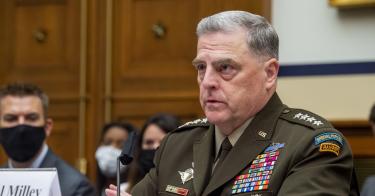One of the things I miss most about being part of the military was the curt phrases that said everything you needed to know about almost anything. Among my favorites was when, after a long meeting, someone would snicker, "That was a Kabuki dance."
I’m not sure how many military people are actual devotees of ancient Japanese culture, but they all, from buck private to four-star general, got this reference to a stylized drama with a predictable ending. And so it was Tuesday when some of the Pentagon’s top brass headed to Capitol Hill to testify. Those expecting a Kabuki dance were not disappointed.
In the hearings, everyone played their roles. To mix some metaphors: Democrats played defense. Republicans went on the offense. Defense Secretary Lloyd Austin; Joint Chiefs of Staff Chairman Gen. Mark Milley; and Gen. Kenneth McKenzie Jr., commander of the U.S. Central Command played goalie, dodging slap shots and passing off the puck whenever they could.
>>> Holding Biden Accountable for the Disastrous Afghanistan Withdrawal
The focus of the hearings were on the cataclysmic withdraw from Afghanistan and the reemerging threat of terrorism from South Asia—though predictably, Gen. Milley was also grilled about his phone call with senior Chinese military leaders.
All the predictable questions were asked. All the answers were predictable as well. They amounted to a concerted effort to cover for President Biden’s disastrous decision-making with every possible excuse. Every effort was made to shift the blame to the Afghans, the previous administration, or others—though surprisingly they didn’t go back to blaming Adam, Eve and the serpent for abandoning Americans, our allies and equipment and leaving behind the foundations for the next 9/11.
What was most interesting about the stylized ritual of the Washington blame game on the Hill was what wasn’t said. None of the officials testifying were willing to detail the full scope of the military advice given to the president. After the hearings, no one is better equipped than before to parse the precise role of the president of the United States in the greatest military and geo-political setback since Vietnam.
In part this reflects the tension of how American civil-military relations are structured to work. On the one hand, it is difficult for a president and his military advisors to have an open and frank exchange of views, if Monday-morning quarterbacks get to pick apart these discussions after the fact. On the other, the Pentagon leadership also needs to be frank and honest with the Congress, as the body exercises its oversight of the armed forces.
Walking this tightrope of tension is a skill that is expected of the nation’s highest-ranking officers. When they lean too far one way, they destroy the trust and confidence that elected civilian leaders and senior military officers place in them. When they lean too far the other, they provide cover for political agendas and undermine their own credibility as selfless servants of the nation.
What we saw on Tuesday was par for the course. This generation of military leaders isn’t particularly adept at parsing politics from policy. It is hard to walk away from this hearing thinking they are serving us well.
That should come as no surprise. From parroting the president’s obsession with climate change, to providing cover for morale-destroying anti-racism training, to not contradicting claims that the ranks are riddled with political extremists, they have not proven well-skilled at protecting the armed forces from abuse by partisan Washington politics.
>>> America Deserves Answers on Botched Afghanistan Withdrawal
Actually, serving this nation, and the men and women they command, requires leaders that can transcend playing part in the Capitol’s political theater and instead deliver hard and honest truths—the way military leaders like George Marshall and Matthew Ridgway used to do.
What we learned Tuesday is that everyone in Washington is well-practiced at their parts. If we are going to get transparency and accountability over what happened in Afghanistan and the threats we now face as result, we are going to need an independent, non-partisan commission like we had after 9/11.
We need a real investigation, not one that looks to diffuse the issue by giving us a history lesson of the last 20 years.
We deserve an inquiry that looks at what really matters—how we left Afghanistan, where we are now, and what we are going to face in the future.
Too bad we didn’t get that on Tuesday.
This piece originally appeared in Fox News




